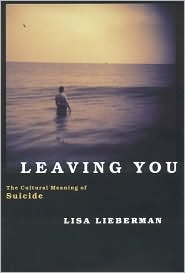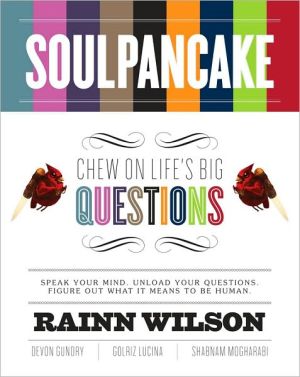Leaving You: The Cultural Meaning of Suicide
At heart, suicide is a subversive act: the assertion of individual will against public authority. How is it, then, that the act of suicide–one with defiant political implications–has come to be viewed as the last refuge of the self-destructive victim? In Leaving You, Lisa Lieberman explores the puzzle of this reigning perception of suicide. Drawing on diverse sources, from biblical stories to Romantic novels, philosophical theories, and psychiatric diagnoses, along with contemporary memoirs...
Search in google:
At heart, suicide is a subversive act. How is it, then, that the act of suicide has come to be viewed as the last refuge of the self-destructive victim? The author explores the puzzle of this reigning perception of suicide. DEATH STUDIES Leaving You...asks provocative questions about how we in the 21st century respond to suicidal violence.
Preface1Defiant Death32Death and Democracy383Sex and Suicide674Leaving You955Tragic Artists130Notes155Index167
\ Philadelphia InquirerWonderfully lucid and nervy meditation...provides an illuminating sketch of suicide over the centuries...enlightening...absorbing.\ \ \ \ \ Death StudiesLeaving You...asks provocative questions about how we in the 21st century respond to suicidal violence.\ \ \ Hampshire Gazette[Lieberman's] enterprise is a noble one: ...to disabuse us of the notion that suicide is meaningless.\ \ \ \ \ MetapsychologyOffers a richly textured historical narrative. Displays a great facility at synthesizing disparate sources...into a compelling explanation…\ \ \ \ \ CHOICELieberman offers a thought-provoking contrast to George Rosen’s classic work on the history of suicide. Highly recommended.\ \ \ \ \ Howard I. KushnerAn intellectually courageous book, Lieberman's arguments challenge conventional views on suicide and deserve serious consideration.\ \ \ \ \ Derek HumphryIn this pithy book Lisa Lieberman explores the underlying influence that literature has had on individual human self-destruction throughout history.\ \ \ \ \ Salon.ComSlender and elegantly written.... The asperity of Lieberman's wit is particularly welcome in this territory...Lieberman sets the bar pretty high.\ \ \ \ \ New England Journal Of MedicineLieberman…is a spirited...writer…. Her attempt to restore...dignity to "the so-called vistim" is...brave and important…\ \ \ \ \ METAPSYCHOLOGYOffers a richly textured historical narrative.... Displays a great facility at synthesizing disparate sources...into a compelling explanation...\ \ \ \ \ New England Journal of MedicineLieberman...is a spirited...writer.... Her attempt to restore...dignity to "the so-called vistim" is...brave and important...\ —REVIEWED BY GEORGE HOWE COLT, M.A.\ \ \ \ \ HAMPSHIRE GAZETTE[Lieberman's] enterprise is a noble one: ...to disabuse us of the notion that suicide is meaningless.\ \ \ \ \ DEATH STUDIESLeaving You...asks provocative questions about how we in the 21st century respond to suicidal violence.\ \ \ \ \ Philadelphia InquirerWonderfully lucid and nervy meditation on the various meanings of doing yourself in....an illuminating sketch of suicide over the centuries.\ \ \ \ \ Salon.comA slender and elegantly written consideration of the different ways suicides and their survivors have interpreted this drastic act.\ \ \ \ \ Publishers WeeklySociety sees suicide as a symptom of insanity and helplessness, the last desperate resort of the mentally or terminally ill. This intellectually rich meditation seeks to reclaim suicide as a "meaningful gesture," both an expression of personal autonomy and a "subversive" critique of society. Cultural historian Lieberman develops this theme in five essays on the shifting meaning of suicide, focusing on 18th- and 19th-century Europe. She explores how older moralistic conceptions of suicide as either an assertion of personal integrity or a sinful privileging of self over God and community gave way to the modern medical and sociological view of suicides as victims of psychiatric illness or social anomie. She also shows how suicide figured as an irresponsible and impulsive affront to liberal democracy in the works of Rousseau and Tocqueville; examines the patriarchal fear of women's "power to disrupt the established order" evident in the literary suicides of Emma Bovary and Anna Karenina; and follows the Romantic cult of suicide as it spread from Goethe's novels into real-life suicide notes. These engaging, erudite but somewhat detached and critical essays are capped by a final, more personal piece on the suicides of artists like Diane Arbus and Sylvia Plath and Holocaust survivors like Jean Amery, whose defiant suicide ("I die," he wrote, "therefore I am") was a "heroic declaiming of dignity" and a bleakly fitting commentary on the irrecoverable loss of his humanity in the camps. Lieberman seems to be searching for a truly justifiable excuse for suicide, and if she cannot quite find it, her provocative and sometimes heartfelt arguments will make readers reexamine the issue. (May) Copyright 2003 Reed Business Information.\ \ \ \ \ Library JournalIn this collection of five contemplative essays, Lieberman takes literary, political, and artistic perspectives on suicide. She expresses her discomfort with contemporary society's approach to suicide, which robs the act of meaning by defining those who kill themselves as victims of mental illness, no matter the circumstances. Her attempt to understand Holocaust survivor Jean Am ry's suicide and her final essay, "Tragic Artists," are particularly provocative. Lieberman, who teaches modern European cultural and intellectual history at Dickinson College, briefly describes the way that suicide has been viewed and treated through history, from Socrates through Augustine and the contemporary Western world, touching upon political martyrdom and sainthood along the way. She reserves most of her attention, however, for literary representations of suicide and the reactions of the reading public, with particular focus on Flaubert, Goethe, and Rousseau. Her lucid discussion will appeal mostly to those curious about suicide's role in literature and those who are looking to go beyond a psychological approach to understanding suicide. She covers some of the same ground as Kay Redfield Jamison does in the more broadly appealing Night Falls Fast. For academic and large cultural studies collections.-Carolyn Kuebler, "Library Journal" Copyright 2003 Reed Business Information.\ \








